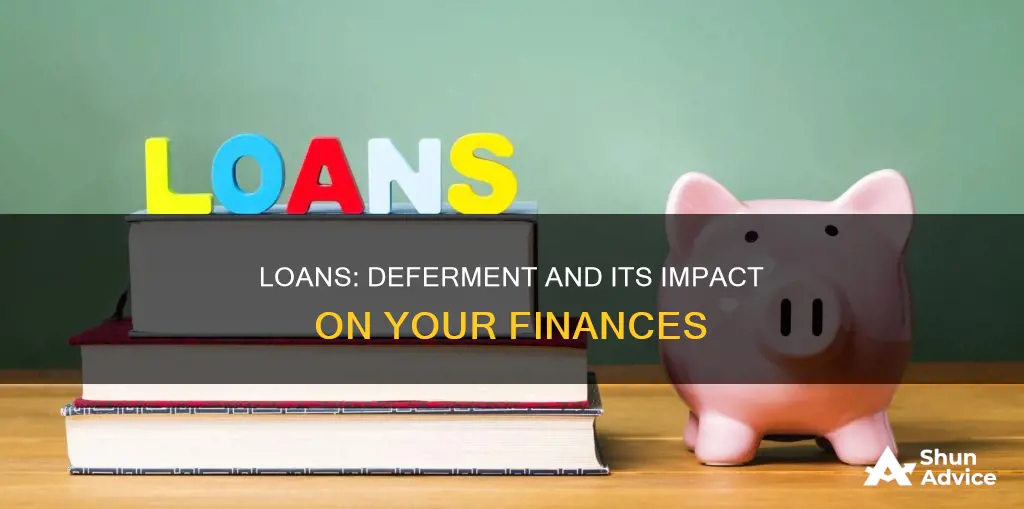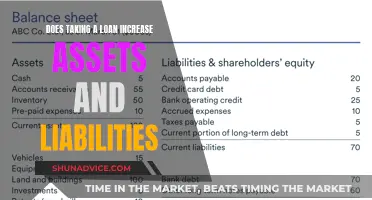
Taking out loans can be a stressful and daunting task, especially with the worry of repayments looming. Deferment is an option that allows you to pause or reduce your loan repayments for a defined period. This option is available for specific situations, such as active military service or returning to school. During deferment, interest may accrue, increasing the total loan amount. It's important to understand the terms and conditions of deferment, as they may vary among lenders and loan types, such as federal or private loans.
Characteristics and Values Table for Student Loan Deferment
| Characteristics | Values |
|---|---|
| Definition | Temporary pause to student loan payments |
| Applicability | Applicable for specific situations like active military duty or re-enrollment in school |
| Interest Payment | Interest accrues during deferment for unsubsidized loans and is added to the outstanding balance at the end of the deferment period |
| Interest Payment Exception | Interest is not payable during deferment for subsidized loans |
| Requesting Deferment | Request with the loan servicer and continue making payments until notified of approval |
| Frequency | Can be requested every 12 months until the maximum allowed |
| Removal | Can be removed at any time if the borrower wants to return to making principal and interest payments |
| Alternatives | Forbearance is an option for federal student loans and some private student loans |
What You'll Learn

Interest accrual during deferment
Deferring your student loan payments can provide financial relief if you're struggling to keep up with repayments. However, it's important to understand that interest accrual during deferment can significantly increase your total loan balance over time.
During deferment, interest continues to accrue daily on unsubsidized loans. This means that even though you're not making principal payments, the interest on these loans will keep adding up. For example, if you owe $35,000 in student loans with a 5.70% interest rate and enter a one-year deferment period without making any interest payments, your total loan balance will increase to over $36,995. This new balance will then be subject to interest charges, further increasing your overall costs.
On the other hand, subsidized student loans, Perkins loans, and the subsidized portion of Direct or FFEL consolidation loans do not accrue interest during deferment. This is because these loans have an in-school interest subsidy, meaning the government covers the interest during authorised periods of deferment.
While deferment can provide temporary financial relief, it's important to consider the long-term implications of interest accrual. If possible, it's advisable to continue making interest payments during deferment to minimise the overall cost of your loan. Alternatively, you may want to explore refinancing options to reduce your interest rate once you begin repaying your loans.
If you're facing challenges with student loan repayments, it's essential to carefully review your options. Deferment can be a helpful tool, but understanding how interest accrues during this period is crucial for managing your financial obligations effectively.
How Loans Can Boost Levered Free Cash Flow
You may want to see also

Applying for deferment
Check Your Eligibility:
Before applying for deferment, it's important to understand the eligibility criteria. Deferments are typically granted for specific situations, such as active military duty, reenrollment in school, internships, or other special circumstances. Verify with your loan servicer or the U.S. Department of Education's list of qualifying reasons to ensure you meet the eligibility requirements for deferment.
Contact Your Loan Servicer:
Reach out to your loan servicer as early as possible to discuss your options. They can provide you with information regarding the deferment process, including any necessary forms or documentation. It's important to initiate this conversation early to understand the specific terms and conditions associated with deferring your loans.
Gather Required Documentation:
Depending on the reason for your deferment request, you may need to provide certain documents as proof of your eligibility. For example, if you are requesting a deferment due to reenrollment in school, you will need to provide proof of enrolment, such as an electronic verification or an enrolment certificate.
Submit the Deferment Request Form:
Obtain and carefully fill out the appropriate deferment request form. This could be a general deferment request form or a specific form related to your circumstances, such as an In-School Deferment Request Form. Submit the completed form to your loan servicer for review and approval.
Continue Making Payments Until Approved:
It's important to note that you must continue making your regular loan payments until you receive notification that your deferment request has been approved. Failing to make payments during this interim period may result in penalties or negative impacts on your credit score.
Understand the Interest Accrual:
During the deferment period, interest may continue to accrue on your loan balance. This means that while you are not required to make principal and interest payments during the deferment, the interest will be added to your loan's current principal, potentially increasing your total loan cost. Making voluntary payments during this period can help reduce the overall cost.
Loans and Unemployment: Impact and Influence Explored
You may want to see also

Deferment options for private student loans
If you are enrolled in school, your federal student loans will automatically go into deferment, and you will not have to make payments on your student loans while you are working towards your degree. You will usually have a six-month grace period after you graduate. You can also request deferment after graduation if you run into financial hardship or have another qualifying reason.
For private student loans, you will need to check with your lender to see if it offers any deferment options. You can request a deferment of up to 48 months for a Smart Option Student Loan or a Sallie Mae graduate student loan, for example, as long as you are enrolled full-time or half-time. You can also request a deferment for up to 12 months (up to a maximum of 60 months) for internships, law clerkships, fellowships, or residencies.
Deferment can be a good option if you are facing financial hardship, as it allows you to pause payments without having to worry about late fees or delinquency. However, it is important to consider that interest might accrue during this time, and you may end up paying more overall.
Understanding Loans: Impact on Assets and Liabilities
You may want to see also

Deferment and forbearance
Deferment
Deferment is generally the better option if you have subsidized federal student loans or Perkins loans and are facing unemployment or significant financial hardship. You may also qualify for deferment if you are attending school at least half the time, receiving state or federal assistance, earning a monthly income of less than 150% of your state's poverty guidelines, or are on active military duty or in the Peace Corps. One of the main advantages of deferment is that it is interest-free for certain types of federal loans.
Forbearance
On the other hand, forbearance is typically a better option if you do not qualify for deferment and your financial challenge is temporary. For example, if you have unexpected medical bills that you will be able to pay off soon, forbearance can allow you to temporarily pause your loan payments and avoid defaulting on your loans. However, it is important to note that interest continues to accrue during forbearance, which can increase the overall cost of your loan.
Ultimately, the right choice between deferment and forbearance will depend on your personal situation and the type of student loans you have. If you are unsure, it is recommended to consult with a financial advisor or loan specialist to discuss your options and make an informed decision.
Borrowing from Your 401(k): Withdrawal or Loan?
You may want to see also

Deferment eligibility
For student loans, deferment eligibility typically requires the borrower to be enrolled at least half-time. This applies to both in-school deferments and economic hardship deferments. In-school deferments have no time limit, whereas economic hardship deferments can last for up to three years if the borrower is receiving state or federal assistance.
For parent loans, deferment eligibility requires the student for whom the loan was taken out to be enrolled at least half-time. Similar to student loans, parent loans come with a six-month grace period.
It is important to note that deferment does not cancel the loan. Interest may or may not accrue during the deferment period, depending on whether the loans are federally subsidized or unsubsidized. For federally subsidized loans, the government pays the interest, whereas for unsubsidized loans, interest is added to the amount due at the end of the deferment period.
Additionally, deferment may be an option for borrowers who are unemployed or unable to find full-time employment. To qualify, individuals must be receiving unemployment benefits or actively seeking full-time work. This type of deferment also requires reapplication every six months and has a maximum duration of three years.
Life Insurance Loan: Impact on Premium Payments?
You may want to see also
Frequently asked questions
Student loan deferment is a temporary pause on loan payments for specific situations, such as active-duty military service and re-enrollment in school. During this time, interest will accrue on your loan balance.
This depends on the type of loan. For subsidized federal loans, no interest accrues during the deferment period as the government covers the interest payments. For unsubsidized federal loans and private loans, interest does accrue and is added to the amount owed at the end of the deferment period.
You can request a deferment of up to 48 months for a Smart Option Student Loan or a Sallie Mae graduate student loan as long as you're enrolled at least half-time. For federal student loans, you can request a deferment of up to three years if you are unemployed or unable to find a full-time job.
You can apply for a deferment with your loan servicer. If you are a student, your school's admissions office can send your enrollment information to the loan servicer to initiate the process.
Forbearance is another option to temporarily postpone loan payments. With forbearance, interest will continue to accrue, and the terms and fees may be less favorable than those of deferment. An income-driven repayment (IDR) plan may be a better option if you expect your financial difficulties to continue.







